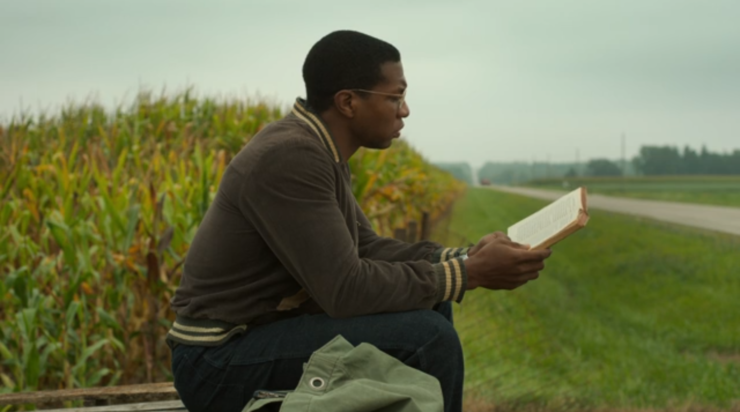I’ve never been terribly interested in H.P. Lovecraft. Besides being a racist jerkwad, he’s also a boring, talentless hack. Lovecraft is really only interesting by virtue of the responses his work has inspired from authors eager to confront and subvert his white supremacist views and other shortcomings. What I enjoyed so much about Matt Ruff’s book Lovecraft Country was how he twisted Lovecraft’s own racism back on him. But the book had its limitations, and there were several moments when it was clear that it was written by a white man. The nuances of the Black experience were absent from the subtext. In several instances, white people solve the problem while the Black characters simply do what they’re told. Caleb Braithwaite doesn’t account for his racism. And don’t even get me started on the problematic resolution of Ruby’s arc.
From page to script, the names and genders of some characters have changed, as have some plot points and the timeline of events, but the skeleton of Ruff’s book remains. With HBO’s vault of cash, Misha Green at the helm, Jordan Peele as executive producer, and an extremely talented cast of Black actors, the missteps of the book are all but resolved (so far). In fact, I’d argue this is one of those rare occurrences where the TV show is actually better than the original book.
Spoilers ahoy.
The opening sequence is a chaotic technicolor dream where aliens and World War II era soldiers duke it out on a red planet. The dream is Atticus’s (Jonathan Majors), a frenetic mash-up of A Princess to Mars and The Jackie Robinson Story. That’s weird enough, but even weirder when we’re reminded that the book’s hero, John Carter, was a Confederate soldier. (“Ex-Confederate,” says Tic. His bus companion, taking a line that belonged to Montrose in the book, replies, “He fought for slavery. You don’t get to put an ‘ex’ in front of that.”). Those dual, competing narratives hold space in Tic’s brain: acknowledging racism while compartmentalizing it. He is the Black boy who wanted to see the world and the Black man who did it by joining the Army to fight a war for a nation that still sees him as three-fifths of a man.
Back in Chicago, Hippolyta (Aunjanue Ellis) and George (Courtney B. Vance) Freeman rehash an old argument. She wants the same thing Atticus wanted as a child, to have grand adventures. Instead, she’s stuck at home. When Tic drops in, he pulls his Uncle George into his plot to find his missing father. The letter Montrose (Michael Kenneth Williams) sent is suspicious but Tic, George, and Leticia Lewis (Jurnee Smollett) head out on a cross-country journey to the rural heart of a New England sundown county.
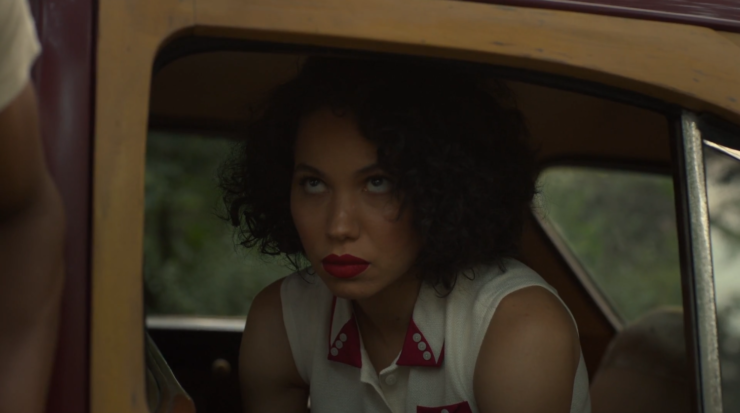
Leti tags along to escape her own familial trials. Recently arrived from Lord knows where, her half-sister Ruby (Wunmi Mosaku) won’t take her in. Their relationship comes with a lot of baggage, although we aren’t yet privy to what’s stashed inside. We see more of this in her fight with her brother Marvin (Demetrius Grosse) in Massachusetts. For her, the choice is either stay in Chicago and get a job as a domestic or run away yet again into the great unknown.
On the way to Ardham, the trio encounter two sets of violently racist white men. The first is in Simmonsville, where a Black entrepreneur was burned out of her restaurant so it could be turned into an establishment so lily-white even the walls are whitewashed. The subsequent car chase ends dramatically, with an intervention by Christina Braithwaite, a white woman with bleach-blonde hair, driving a silver Bentley and wearing a spectacular hat.
The second encounter also ends in a rescue, but not after nearly killing our heroes. Knowing all the risks, the trio head into Devon County. While trying to find the road that will lead them to Ardham, the local sheriff—a man whose NAACP file is several inches thick with accusations—pulls up. This time the car chase is slow, Atticus needing to stay at the speed limit, but instead of finding freedom at the county line, all they get are more cops. They’re marched deep into the woods, but before the sheriff can disappear them for good, horrifying monsters erupt out of the trees. Gory violence ensues, but the trio survive until dawn. Bloodied and exhausted, Tic, Leti, and George stumble to the door of a castle.
Like Ryan Coogler’s Black Panther and HBO’s Watchmen, Lovecraft Country turns genre tropes into something devastatingly real. By re-centering a traditionally white-dominated story on mid-20th century Black characters, we encounter new insights and new revelations. The villains here aren’t just chthonic creatures or wicked wizards but good old-fashioned racism and white supremacy.
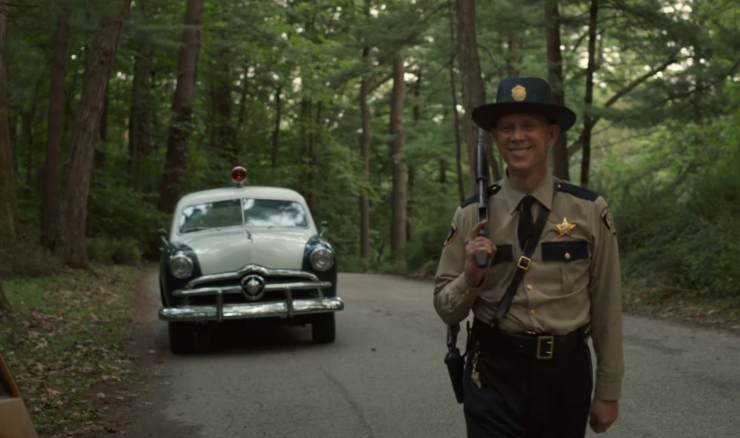
Lovecraft Country is horror, not just because of H.P. but because of the reality it depicts. Sure, some of the scenes may seem obvious or blunt, but racism isn’t exactly known for its subtlety. Only the privileged can think of it that way. For the rest of us, racism is an ever-present monster seething in the shadows. We know it’s there and we know there’s nothing we can do to stop it from lashing out at us. White people can insist the monster doesn’t exist or isn’t as vicious as we claim, but that doesn’t make its teeth any less sharp or its bite any less painful.
Being attacked by racist cops who can act with impunity is a real-life horror for Black people. Being threatened by white people for the crime of existing in public is a real-life horror for Black people. Being beaten within an inch of your life by white men is a real-life horror for Black people. I’ll tell you what, I stopped breathing during the walk in the woods with Sheriff Hunt. I knew the shoggoths would intervene, but I still tensed up. How could I not when my kin are being brutalized and tortured and killed every damn day? The monsters may be scary, but white supremacy is the real terror here.
Buy the Book
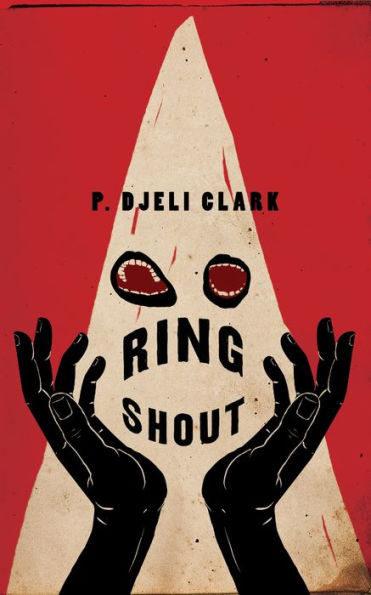

Ring Shout
One of the things the show does so well is examine the generational differences between African Americans. George and Montrose are from my grandparents’ generation, and both they and George and Montrose were tough-as-nails parents who loved their children by enforcing rules, teaching hard lessons, and by trying to protect them from white violence. Like my grandparents, they abandoned the South for the opportunities of the North—my grandmother helped unionize the Stanley Tools factory in Hartford and made sure Black women were able to join—and wanted their children to make the most of those options. Because that generation was so close to slavery, that generational trauma was a wound that would never heal—especially not when Jim Crow kept slicing it open. Montrose’s abuse toward his son is an echo of the abuse he suffered at the hands of his father, which itself is an echo of lifetimes upon lifetimes of enslavement. It doesn’t excuse the behavior, but makes it easier to understand the problem in context.
Atticus and Leticia represent the two different aspects of the younger generation, the one that would guide the Civil Rights Movement. On one hand you have Tic, who just wants to survive in a world that would not just celebrate his death but hasten it. On the other you have Leticia Fuckin’ Lewis, who would face a fight knowing she might lose but holds her ground anyway. Tic isn’t against resistance, he’s just more pragmatic about it, while Leti is full of fire and fury. Both personalities were vital to the Civil Rights Movement. No way we would’ve gotten as far as we did without Martin and Malcolm’s voices and the way they both found ways to bridge their gaps over time.
Still not convinced that you should watch Lovecraft Country? Then let me shout at you about the absolutely incredible acting. Jonathan Majors blew my mind wide open as Montgomery Allen in The Last Black Man in San Francisco (if you haven’t seen it, you need to fix that oversight immediately) and he’s equally as impressive here. He brings so much depth and subtlety to Atticus. Last seen as Dinah in Birds of Prey (and the Fantabulous Emancipation of One Harley Quinn)—aka my favorite movie of 2020—Jurnee Smollett shines as Leti, a young woman who has seen more than her share but is still willing to demand what she deserves. You should already know the tremendous talents of Courtney B. Vance and Michael Kenneth Williams so I won’t rehash them here, but suffice it to say they are as great as they’ve always been. Give the casting director all the awards.
The special effects are great, the production and costume design are gorgeous, the editing and cinematography are superb, and the soundtrack is fucking killer. The show is firing on all cylinders. As far as the first episode is concerned, there isn’t a single thing I’d change. I love it. I am in love with it. It’s everything I ever wanted and then some.
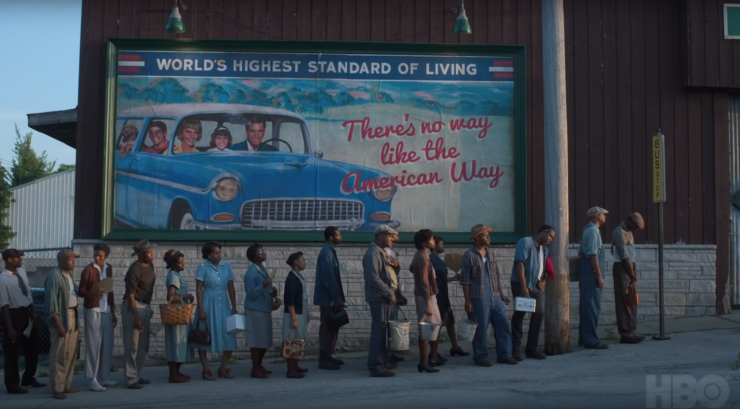
Cultural texts referenced:
- A Princess of Mars by Edgar Rice Burroughs (serialized 1912)
- The Outsider and Others by H.P. Lovecraft (published 1939)
- “On the Creation of Niggers” by H.P. Lovecraft (written 1912)
- Herbert West—Reanimator by H.P. Lovecraft (serialized 1922)
- The Count of Monte Cristo by Alexandre Dumas (serialized 1844-1846)
- Dracula by Bram Stoker (published 1897)
- The Bible verse Leti repeats is from Psalms 23
- The shoggoths come from H.P. Lovecraft’s At the Mountains of Madness (serialized 1936)
- The narration from the dream sequence is from the 1950 biopic The Jackie Robinson Story.
- The speech that plays over the montage of George, Leti, and Tic driving through the Midwest is a snippet of a famous 1965 debate, “The American Dream is at the expense of the American Negro,” between James Baldwin (the man who is speaking) and William F. Buckley Jr. Later in the speech Baldwin says, “I picked the cotton, and I carried it to the market, and I built the railroads under someone else’s whip for nothing. For nothing.” Hold that truth in mind as you watch this show.
Final Thoughts
- I am OBSESSED with Ruby looking like Rosetta Tharpe while singing “I Want a Tall Skinny Papa”.
- Don’t think I didn’t notice how the background went literally off the map for the Ardham location text.
- Montrose’s record player looks handmade, a callback to the novel where Montrose wouldn’t buy a TV, but Atticus jokes that if he could buy one in a kit and put it together himself he probably would.
- In the book, Horace gives his mother the 11th issue of his comic about Orithyia Blue. In the show, Dee gives the first issue to his father instead.
- Who is the Korean woman Tic calls? She’s not in the book. Color me intrigued.
- Whew, that travel montage where the outloud racism and the quiet racism are juxtaposed together.
- The shot of the Black people lined up at the bus stop in front of the advertisement showing a white family in a car is a reenactment of this photo, while the German Shepherds are a nod to how cops used them to attack Civil Rights protestors.
- Sheriff Eustace Hunt goes from monster to Monster.
- Delilah is crasser and meaner on the show than she is in the book, which will make her inevitable comeuppance that much sweeter.
Alex Brown is a teen services librarian by day, local historian by night, author and writer by passion, and an ace/aro Black woman all the time. Keep up with her on Twitter and Insta, or follow along with her reading adventures on her blog.










